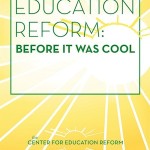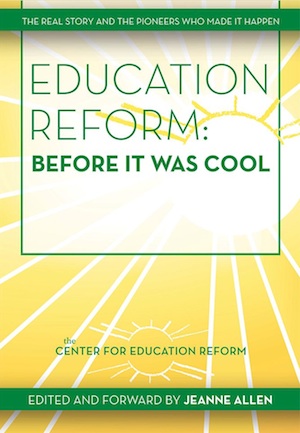Vol. 16, No. 14
SINK OR SAIL. There’s a perfect storm brewing in Tennessee, with proposals aimed at expanding educational choices coming from all directions. It’s a perfect storm because while there are pieces in place that could expand the state’s charter school sector, there are also proposals that would help expand the entire portfolio of options for Volunteer State children, and students need quality schools of ALL shapes and sizes. Items proposed run the gamut of factors that affect much-needed Parent Power from permitting parents to petition for change in schools, to awarding opportunity scholarships for underserved students, to creating more favorable conditions for charter schools to truly flourish. It’s extra critical that lawmakers put aside political considerations to focus on legislation that would both increase school choice and accountability for students who deserve better. Now, it’s time to seize the opportunity.
DEAN OF STUDENTS. In an evolution possibly slower than Vermont’s signature maple syrup, former Green Mountain Gov. Howard Dean recently declared a newfound support for the charter school movement and the young generation of reformers set on finding solutions to America’s educational woes. Dean has been out of office for a few years now, but better late than never for witnessing first-hand the benefits of charter schools. When talking about his son’s experience teaching in an inner city school, Dean correctly frames the conversation of obtaining a quality education as a civil rights issue, prompting his realization of the need for any solution that could improve the U.S. school system. Dean’s conversion reinforces that lawmakers should take time and visit charter schools to see how they’re a positive force in the communities they represent before taking a status-quo stance against these innovative schools.
TELL THE TRUTH, MR. ATTORNEY GENERAL. U.S. Attorney General Eric Holder is dismissing the claim that the DOJ has taken an anti-voucher stance in its actions against the Louisiana Scholarship Program, saying it was only looking for information about the program and never intended to stop it in its tracks. Holder must be forgetting that pesky injunction the DOJ initially sought against the program, which was pretty hard to miss seeing as it was the very first item mentioned in the original complaint. After all, the injunction was the major reason why the DOJ’s actions deserved condemnation in the first place. If Holder really meant what he said (under oath), the DOJ would end efforts to provide excessive oversight over a popular and necessary program for so many Louisiana families.
A REAL K12 EDUCATION. According to K12 Inc. educator Summer Shelton, the online learning experience is just like being in a brick-and-mortar classroom in terms of what’s being taught, except that students are being educated completely online instead. And, being educated online doesn’t mean that students aren’t held to high expectations. Online learning is a growing and exciting trend, but many parents still don’t have the necessary access to the best options that fit their child’s learning needs. Provided an online experience is right for a student, learning is based on mastery of subjects, and educators like Shelton are held to high standards themselves. As student populations continue to grow (in the coming years it’s expected that the U.S. will gain 11 million more students!), it’s paramount to increase availability of new and innovative options, and inform parents through toolkits and media of the facts behind approaches such as online learning.
EDUCATION REFORM: BEFORE IT WAS COOL. Finally, there is now a detailed anthology of the modern-day education reform movement designed for people who want to understand the real practice and successes of the past 20 years by the pioneers in the field who worked tirelessly to improve schools for all children. Broken down into seven parts, this indispensable book is great for anyone interested in learning about the groundwork laid for the next generation of reformers. Click here to secure your copy today!
JOIN SUNSHINE STATE PARENTS making their voices heard THIS Wednesday at a press conference at the FL State Capitol, sharing how charter schools have positively benefitted their children. Click here for more information. Don’t forget to like The Florida Parents Network on Facebook so you can stay informed on preserving the rights of parents to choose quality schools for their child, expand in-demand options and ensure all students are receiving equitable treatment.












The Real Threats to Charter Autonomy
In recent remarks, Robert Cane, executive director of Friends of Choice in Urban Schools (FOCUS), issued a powerful warning to the charter school movement in the District of Columbia.
Cane spoke of the momentous progress that has been made over the years in making charter schools promising educational options for DC students, but also of the threats to derail the engine driving much-needed reform in the District.
There’s no denying the strides made in DC’s efforts to create a robust charter school environment and the increased student proficiency as a result, but even the most Parent Power friendly areas still face challenges.
Of all the attacks on the charter movement, Cane says, “the most insidious is the continuous assault on what truly defines charter schools: individual-school control over operations and freedom from burdensome oversight.”
This assault comes through in a number of ways, from the ‘controlled choice movement’ to the burdensome regulations charter schools increasingly endure.
Said Cane, “Over the years legislation and regulations have been proposed that, for example, sought to require every charter school to use the same reading program; to impose uniform truancy and disciplinary policies and procedures on charters; to require every charter regardless of its mission, to adopt “universal values,” “financial literacy,” and “environmental literacy” curricula.
He continued, “Now getting serious traction nationally, the controlled choice movement would limit choice by empowering the government to centrally engineer school admissions in order to achieve increased racial and socioeconomic diversity or other goals.”
“The idea that central planning of any kind should be applied to the charter schools is more frightening than any moratorium on chartering,” he said.
In Cane’s view, charter autonomy is crucial to improving student achievement:
“The success of the charter schools also shows what all of us already know: that we’re still far short of our goal of educating every charter school kid to the limits of his or her ability. I know that many charter educators spend the majority of their waking hours working on this problem and I’ve no doubt that over time they’ll solve it in their own individual ways if given the leeway to do so.”